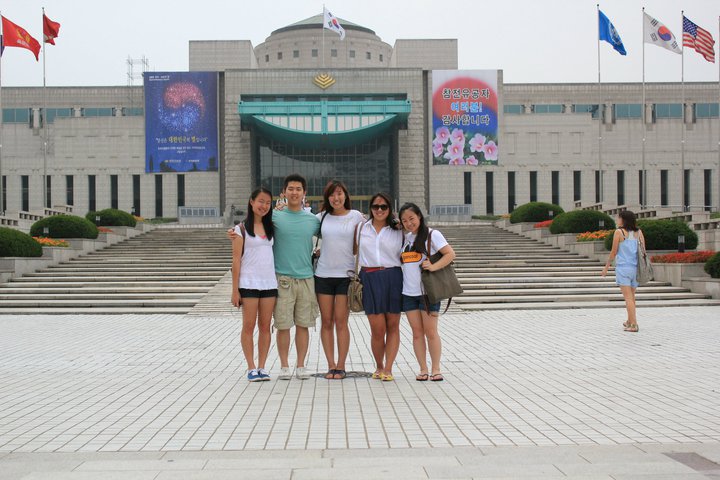So, Korea holds a very special place in my heart (I tend to be drawn to countries recently torn apart by civil war, -cough- Spain -cough-). It was the first place I had ever traveled to by myself, a fact that never really freaked me out as much as it should have. I studied at Yonsei University two summers ago in 2011 after helping start a program at my college to join with Yonsei's Summer Program. I'll admit, I was a little lazier with experiencing the culture than I should have been. Sure I lived in the heart of Seoul, and I did a lot of things that were new to me, but I really didn't take advantage of my time as much as I could have. I was more into the contemporary pop culture and less about what makes Korea, Korea. Nowadays, I'm playing catch-up, but that's another story. One of the cultural things I did do, however, was visit the War Memorial of Korea. It's a museum commemorating all the wars Korea has been through, but obviously there was a huge emphasis on its most famous one.
With all that is in the news today, combined with my recent view of Taeguki, and my burning to desire to return to this country, I feel like I have a duty (not to mention I want to talk about this) to shed some light on the situation to people who may not have a clue. So I'm starting a series of posts to quickly inform (that is, if you skip through my two paragraphs of rambling) you crafters, girly-girls, etc of a very important issue that has giant effects on a global scale. You should be a little worried about Korea because this country is one of the most unstable in our world today. It is a reminder of the past that generations before us lived through. A world where ideologies took center stage, and people fought for a belief alone. The Spanish Civil War. The Iron Curtain. The Soviet Union. Hitler. World War One. World War Two. The things that defined the twentieth century continue through this peninsula. Yes, that's oversimplifying it a bit. Obviously, other countries (-cough- China and Taiwan -cough-) have their issues, but none on such a scale as the DPRK and ROK. Especially now, what with a new DPRK dictator and the recent threats that have been coming from them, not to mention the thousands of North Koreans who are dying of starvation, largely forgotten behind these ideologies.
Basically, TL;DR I'm going to inform you-all about the Korean conflict as quickly as I can so you're going to have an idea of what's going on there and why it's important.
T H E B A S I C S
North Korea:
- The Democratic People's Republic of Korea (DPRK)
- Communist
- Leader: Kim Jong Un
South Korea:
- Republic of Korea (ROK)
- Democratic
- Leader: President Park Geun Hye
The Korean War: 25 June 1950- 27 July 1953
- Started after the defeat of Japan, which had controlled Korea previously, in WWII. The USSR took control of the north and the US took control of the south. It was divided at the 39th parallel. (Yes, this should sound eerily familiar. It's how Germany and the rest of Europe turned out for a while!)
- Began when the north attacked the south.
- China was/is an ally to the north, the US and UN were/are allies to the south.
The Armistice: A peace agreement to end fighting between both sides. It is not a treaty, so technically Korea has been at civil war for almost sixty-three years. It was signed on July 1953.
The Demilitarized Zone (DMZ): Located at the 38th parallel, is 155 miles long and 2.5 miles wide.
Recent Events:
- North Korea originally ended the truce in 2003 via its news agency, though it appears to have resumed it.
- Ended it again in 2009 because South Korea was joining the US anti-proliferation plan
- In 2010, North Korea bombed Yeongpyeong Island.
- Which means, yes, I somehow managed to still make my parents let me go to Seoul the following summer.
- In 2011, Kim Jong Un assumed leadership over Korea after his father, Kim Jong Il died.
- Just recently the DPRK ended its truce with the south again.
Hope this gives you a brief overview of the conflict. I'll have more posts in the future. Let's just say, I didn't become an International Studies Major because I overall don't enjoy politics or tests or a lot of what goes on in classes necessary for IS degrees, but when it comes to the Korean Conflict and anything to do with human trafficking, I sometimes wish I did.
You can read more here.
